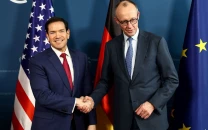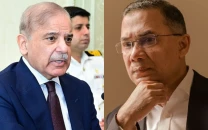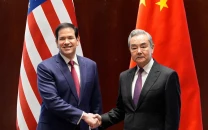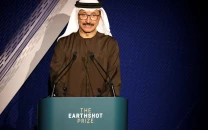Mr Sharif’s foreign policy challenge
Point to ponder for Mr Sharif: it takes one to make war but always two to make peace.

The writer is Editor, National Security Affairs at Capital TV and a visiting fellow at the SDPI in Islamabad
Point one: In real life, there’s invariably a gap between the desirable and the doable.
Point two: the PPP government did fairly well in the domain of foreign policy, investing heavily in normalising ties with India and reaching out to Afghanistan. Yet, relations with both are worse than before, after having shown an upswing.
Point 3: there’s no tabula rasa. States don’t go back to the drawing board. Reason: if we consider the state in an organisation model as the umbrella organisation made up of sub-organisations, often independent in their operational work, we can understand the reasons for its inability to optimise.
This, the prime minister will have to understand since there is no full-time foreign minister.
Political scientist Graham T Allison presented three models in his study of the Cuban Missile Crisis. One of them relates to organisation theory. He was drawing on an earlier work, Organizations, by James March and Herbert Simon. Government actions are not the outcome of individual choices but organisational inputs. To encapsulate: Organisations factor problems into different parts. This means they deal with them not holistically but non-simultaneously; organisations ‘satisfice’ rather than optimise; they deal with problems using known, standard processes. This limits choices; they deal with uncertainty by making decisions rather than resorting to finding alternatives; these multiple processes are generally not in harmony, and therefore, may not add up to a strategic picture.
It’s about the immediate and the operational rather than about the larger picture. Morton Halperin in his Bureaucratic Politics and Foreign Policy (both the earlier and the 2006 editions) discusses how government politics impacts foreign and national security policies.
These points are also raised by Scott D Sagan in his article “The Perils of Proliferation: Organisation Theory, Deterrence Theory, and the Spread of Nuclear Weapons” for International Security. Sagan argues that “Organisations, by necessity, develop routines to coordinate action among different units: standard operating procedures and organisational rules, not individually reasoned decisions, therefore govern much behaviour.” They “often accept the first option that is minimally satisfying”. This makes organisations “myopic”, which throws up the problem of “biased searches” because “instead of surveying the entire environment for information, organisation members ... [focus] only on specific areas stemming from their past experience, recent training, and current responsibility.”
Suffering from “‘goal displacement’, [organisations] often become fixated on the operational means to the ends and lose focus on the overall objectives”. March and Simon argued that “the world tends to be perceived by the organisation members in terms of the particular concepts that are reflected in the organisation’s vocabulary. The particular categories it employs are reified, and become, for members of the organisation, attributes of the world rather than mere conventions.”
But an even bigger problem is that “complex organisations commonly have multiple conflicting goals and the process by which objectives are chosen and pursued is intensely political. Such a political perspective ... [serves] the narrow interests of some units within the organisation, even if the actions appear ‘systematically stupid’ from the leadership’s over- all perspective.” In other words, “Organisations are not simply tools in the hands of higher level authorities, but are groups of self-interested and competitive sub-units and actors”.
This then, and more, is the landscape in which Mr Sharif has to play. He has not only to deal with these problems within but also contend with international state actors that have to deal with similar problems at their end. In other words, no one person, regardless of how well-intentioned or powerful he might be — the example of the United States president comes to mind — can turn a desire into a course of action. In Sagan’s words, “To the degree that narrow organisational interests determine state behaviour, the expected-utility theory of a rational unitary actor is seriously undermined.”
Take India’s example. While we know the power the Pakistani military wields in policymaking, Mr Sharif will be well-advised to beware of the smart workarounds the Indian military has developed within the policymaking web of that country. That even discerning Indians tend to shy away from seriously studying this problem may be good nationalism but doesn’t make rigorous scholarship.
The recent flare-ups and India’s response have three broad reasons: Kashmir, which refuses to go away even after Pakistan has dropped the dispute like a hot potato; the reorganisation and emergence of a political rightwing that seemed in disarray only three-four years ago; and the dwindling economy where the growth rate has plummeted from slightly upwards of nine per cent in 2010-11 to about five per cent in 2013-14. The rightwing is eyeing the coming elections and building pressure on the government, the military, sensing budget cuts, requires a hyped-up situation with Pakistan. And Kashmir remains a case of political and security ineptitude.
From 17.6 per cent (2012-13) and 11.6 per cent (2011-12), India’s defence budget this year has seen a hike of merely 5.3 per cent. This is directly owed to the slowdown. Even last year’s hike was part of a strategy of overall fiscal profligacy but that policy hasn’t worked. Even as revenue expenditure in some cases has been cut, it’s the capital expenditure that is likely to take a hit. The navy’s modernisation budget is already down by about 29 per cent. There are other finer details but the point is this: if the economy doesn’t pick up, the Indian military’s big ticket items will be impacted and there could be further cuts in pay and allowances.
The rule is simple: no large-scale bureaucratic organisation likes budget cuts. Nowhere; almost never. India under threat makes a good slogan. This is why the Indian military has co-opted certain sections of the media to get its footage of fake firing incidents across the LoC and photographs showing ‘Pakistani’ landmines planted, most incredibly, by Pakistani troops in areas heavily guarded by the Indian military! And the obliging media has swallowed this hook, line and sinker.
Point to ponder for Mr Sharif: it takes one to make war but always two to make peace. Corollary: keep the goal in sight but appreciate the situation rather than situating the appreciation.
Published in The Express Tribune, August 21st, 2013.
Like Opinion & Editorial on Facebook, follow @ETOpEd on Twitter to receive all updates on all our daily pieces.



















COMMENTS
Comments are moderated and generally will be posted if they are on-topic and not abusive.
For more information, please see our Comments FAQ